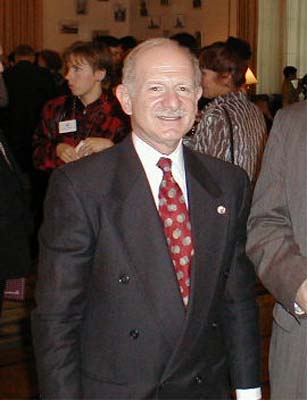
Mark Schneider is the Afghanistan expert for the International Crisis Group, where heís also senior vice-president. Mr Schneider has recently testified before the US Senate on the situation in Afghanistan
Mark Schneider is the Afghanistan expert for the International Crisis Group, where heís also senior vice-president. Mr Schneider has recently testified before the US Senate on the situation in Afghanistan and he spoke to me a short time ago from Washington.
MARK SCHNEIDER: Well I think that thereís a great deal of doubt about NATOís willingness and capacity to respond. Weíve been following the situation in Afghanistan closely, and that in a sense is a first priority in terms of NATO itself.
The problem is that it acquired the responsibility essentially to help provide international presence with respect to security last fall, and recognised immediately in taking over this responsibility from individual countries that to provide security it needed to do it not just in Kabul but outside Kabul, which required more than the, at that time, 5,000 troops. It needed somewhere around, at least double that.
ELEANOR HALL: So why are NATO forces still not there then? Why are not enough NATO forces there?
MARK SCHNEIDER: I think itís a question of political will on the part of the member countries. Thereís no question that in terms of military analysis - to provide the kind of security that will permit reconstruction to take place, permit the election registration in the countryside to take place, to strengthen the possibility for disarming the militia, various warlords, that NATO needs additional troops in the field, in the countryside, and thus far, unfortunately, the political will on the part of the member countries has not been sufficient to produce those kinds of troop commitments.
ELEANOR HALL: Weíve been hearing reports that the security situation there may actually be deteriorating. There are five aid workers killed just this week. I mean what does it say about NATOís ability to lead a coalition like this that the will is not there to bring extra forces in?
MARK SCHNEIDER: I think thereís no question that NATO, were it to meet the manpower and equipment needs, could do the job. It has not done that, as a result, as youíve noted, thereís been a deterioration in security. And I think that the reality is that the upcoming summit meeting of NATO heads of state in Istanbul on the 27th and 29th of this month, will really be the telling period as to whether or not they come forward, as the member countries come forward, and meet the requirements, not merely for maintaining the current levels, but for a very significant increase.
ELEANOR HALL: Now you say that the will is just not there to bring the forces in. Whatís at stake in Afghanistan if these forces arenít brought in?
MARK SCHNEIDER: Well I think you have a very serious situation which the international community found the Taliban government to be a sanctuary for terrorists, and took it down, but now is responsible for helping to, essentially, permit the building of a new state there that will respond to the needs of the people and also to ensure the international community that there will not be a restoration of a Taliban regime or another extremist regime thatís willing to accept terrorists among it.
ELEANOR HALL: Given that, why do you think the NATO countries are not willing to commit these troops?
MARK SCHNEIDER: Well thereís two views for it. One is that itís still a faraway place, thereís still a lack of public recognition of the need and the relationship of their own security and other parts of the world, and NATO countries themselves . And the second is that the NATO countries over time have decreased their military capabilities such that the number of combat-ready forces that they actually can project is limited.
ELEANOR HALL: You seem to be suggesting that NATO isnít really capable of doing this in Afghanistan.
MARK SCHNEIDER: No, on the contrary, I think it is. I think there has to be a political decision made, and I happen to have substantial faith in the capability of NATO to fulfil its commitment if that political will is there.
ELEANOR HALL: But why do you have that faith in NATO?
MARK SCHNEIDER: Because Iíve seen them operate in the Balkans, and I think that they do have that capability. The credibility of NATO in Afghanistan in what they have done is very high, and I think that the issue really is, again, more political than military at this moment.
ELEANOR HALL: So essentially, the idea of NATO, not only operating in Afghanistan, but extending that operation to Iraq, is just unrealistic in your view?
MARK SCHNEIDER: I think at this point, if theyíre going to fulfil their commitment first to Afghanistan, that one would have to raise serious questions about the feasibility of that proposal.
ELEANOR HALL: Mark Schneider, the Afghanistan expert for the International Crisis Group, speaking to me from Washington.
